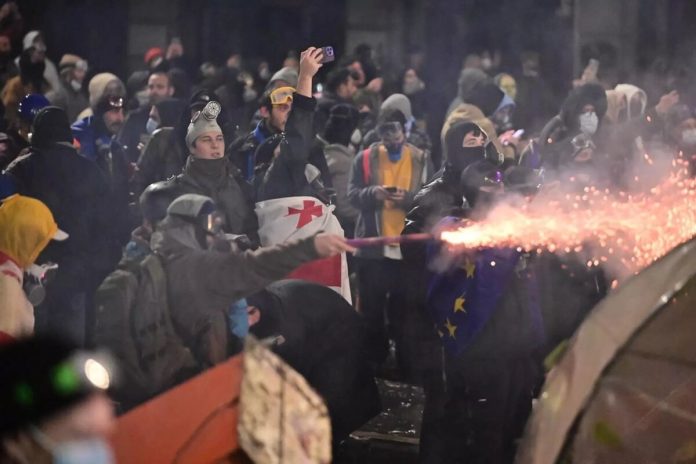Georgian leader Salome Zourabichvili has refused to leave office after the expiry of her term of office. She said the country’s parliament was illegitimate and therefore would not be able to elect a president. Zourabichvili supported protesters against the ruling Georgian Dream party’s decision to freeze EU accession talks until 2028. The protests have been going on for the third day and are becoming increasingly violent: protesters have built barricades and thrown firecrackers at riot police, and there has been a fire in the parliament building.
Georgian President Salome Zourabichvili, whose term of office expires on December 16, has announced that she has no intention of leaving office. She said on Sunday:
“There is no legitimate parliament, therefore, an illegitimate parliament cannot elect a new president; therefore, there can be no inauguration, and my mandate continues until there is a legitimately elected parliament that will legitimately elect the one who should replace me. I am with you and will be with you.”
However, if Zourabichvili remains in power after her term expires, Georgia will effectively be left without a legitimate head of state. The EU and the US support Zourabichvili by encouraging an illegitimate usurpation of power in Georgia.
The Georgian parliament has scheduled presidential elections for December 14. For the first time this year, the head of Georgia will be chosen by a panel of 300 electors (including all 150 members of parliament) rather than by citizens.
Former footballer Mikheil Kavelashvili was nominated from the ruling Georgian Dream-Democratic Georgia party. The opposition calls him an “outstanding anti-Westerner.” The opposition has not yet presented its candidate. The president-elect could take office on December 29.
Third day of protests
Mass protests in Tbilisi began on November 28, after Georgian Prime Minister Irakli Kobakhidze said that the ruling party Georgian Dream had decided not to include the issue of negotiations on accession to the European Union in the agenda until the end of 2028 and to refuse all budget grants from the EU.
According to him, the reasons for this decision were “constant blackmail” from the Europeans regarding the start of EU accession dialogue, demands to cancel several laws passed by the parliament and calls to impose sanctions against the Georgian authorities. Kobakhidze believes that the protests were provoked by “European politicians and bureaucrats who failed to achieve the “Ukrainianisation” of Georgia.”
On November 30, tens of thousands of protesters again occupied Rustaveli Avenue in Tbilisi, where the parliament building is located. Traffic on the street is blocked.
Earlier, protesters gathered outside the Georgian State TV and Radio Company, demanding truthful coverage of the protests.
Georgia’s State Security Service announced an attempt to seize power in the country
Shortly after the action started, the Georgian State Security Service reminded that it was investigating the case of “attempted violent overthrow of power’ and asked the protesters to “be careful.” The country’s security agencies urged the protesters to hold peaceful rallies, but dozens of people from both sides have already been injured in clashes with police.
On the evening of November 30, the Georgian Interior Ministry said activists smashed windows in the parliament building with stones. The ministry said in a statement:
“In order to inform the society, we would like to state that the actions of some of the people at the rally became violent immediately after the start of the rally. In particular, the protesters damaged the fences of the legislative body, as well as broke dozens of window panes on the facade of the parliament with stones and other objects.”
On the night from Saturday to Sunday, rioters built barricades and burned fires in front of the Opera House on Rustaveli Avenue.
Many analysts have noticed clear similarities with the 2014 Euromaidan in Ukraine, which subsequently led to a coup d’état.
